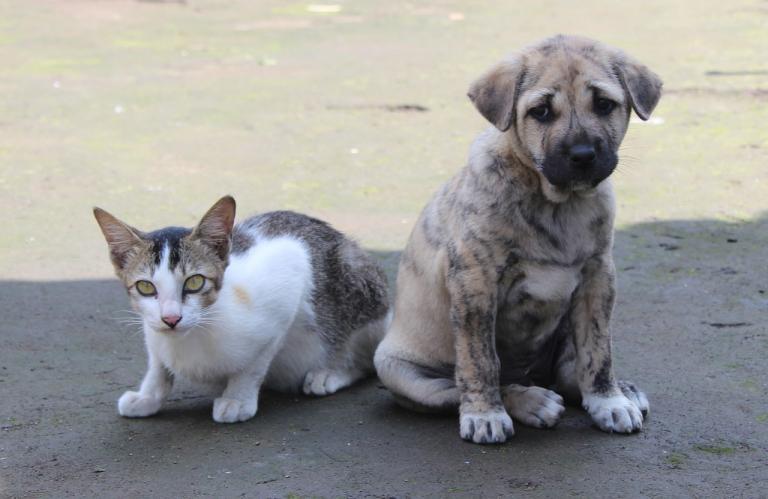A study of pet ownership has found that religious people are just as likely to own dogs as everyone else, but they are markedly less likely to own cats.
So reports Scott A. McGreal in Psychology Today in his article entitled Why Religious People Are Less Likely to Own Cats.
The study*, by S. L. Perry and R. P. Burge, found that religious people, defined as those who regularly attend a religious service, owned fewer pets than those who were not religious. But digging deeper, they found that the difference was pretty much completely accounted for by the fact that religious people own fewer cats.
The study found that education, age, ethnicity, politics, income, gender, and theological conservatism didn’t matter, bolstering the conclusion that people who frequently go to religious services–whether evangelical, mainline Protestant, or Catholic–tend to have dogs as pets, but not cats.
Why should that be, and what does it mean?
Psychology Today, of course, proposed psychological reasons. The article cited research into the difference between “dog people” and “cat people” that “found that self-identified dog persons were more extraverted, agreeable, and conscientious compared to self-identified cat persons, while the latter were more neurotic and open to experience than dog persons.” A more detailed study concluded that
dog people were higher on warmth, rule-consciousness, social boldness, and liveliness, while cat people were higher on reasoning (intelligence), abstractedness (imaginative, etc.), emotional sensitivity (sensitive and intuitive rather than utilitarian and practical), and self-reliance (solitary, individualistic). The authors of this study found that the most prominent differences in these personality traits were that dog people were particularly higher in rule-consciousness, liveliness, tough-mindedness (i.e., being pragmatic rather than idealistic), and extraversion, while cat people were particularly higher in reasoning and emotional sensitivity.
Based on this, the authors suggested that cat people seemed to have a personality profile associated with being more creative, non-conforming, and unconventional, because of their greater imagination, intelligence, and emotional sensitivity, as well as their willingness to disregard social norms. Dog people, on the other hand, tend to be more practical and more interested in fitting in with their social group.
The implication is that religious people are conforming, conventional, less imaginative, less intelligent, less emotionally sensitive, and more in thrall to social norms. But since these religious service attenders are a minority, in what sense are they conforming to social norms? And is there really a dichotomy between being “practical” and “tough-minded” (dogs) and “intelligent” (cats)? Or between “warmth” (dogs) and “emotional sensitivity”? And do “intelligence” (cats), which implies objectivity, and such subjective-favoring qualities as “creativity,” being “imaginative,” and being “intuitive,” (cats) necessarily go together?
Clearly, lots of religious people do like and own cats. As is typical today, religious people are all grouped together as one, or sorted out into overly broad categories. I wish the study would break it down more. Muslims believe dogs are unclean–so do they have cats instead, or do they just not have pets at all? And there is great diversity among “evangelical,” “mainline Protestants,” and even “Catholics.” Of that smaller set of religious cat owners, what, exactly, is their theology? We know that Luther was a dog person (see this and this and this). Do the religious cat persons tend to be clustered around specific theologies, such as Anglicans or Methodists? And lots of religious people like and own both dogs and cats. Are those folks psychologically integrated in some unusual way?
But let’s assume the psychological profiling is, at least in some way, valid. It still doesn’t tell us much. What is there about dogs and cats that is so appealing to these different personality types? I can accept that a cat owner might have “emotional sensitivity,” but surely a cat is the epitome of cool ruthlessness. And if dog owners are “practical” and “tough-minded,” surely that cannot be said of the typical goofy, perpetually cheerful dog. What, exactly, is the appeal?
And since we are considering religion, are there any religious reasons why most believers would prefer dogs to cats? I will offer my speculations and invite you to offer yours in the comments.
Cats are uncanny.
Maybe it’s the way their eyes shine. Maybe it’s their apparent detachment or the stealthy, quiet way they move. Or their seeming cruelty as they play with and torment their prey. Cat haters find them “creepy.” This sense of the “uncanny” that humans often get from cats can get mixed up with the supernatural, and not in a good way. The Egyptians worshipped cats as gods. Cats were associated with witches. And cats figure in many superstitions (e.g., you’ll have bad luck if a black cat crosses your path).
Secularists who assume all religions and all manifestations of the supernatural are the same may not appreciate how people with an actual religion are often put off by what they might sense as bad spiritual connotations.
Cats are complicated.
A cat can be cute, as in the ubiquitous cat videos. But they are also killing machines. Little fluffy can wipe out your bird population. Nature in the wild is that way: utterly beautiful, yet unforgivingly dangerous. This complicated dimension of cats, as with Nature and reality in general, can be unsettling. Religious people have sort of resolved this, with goodness winning out eventually. But God is also both dangerous and loving, so some of us religious people are fascinated by these polarities, as embodied in cats.
Cats are Law; dogs are Gospel.
Dogs are always exuberantly happy to see you. They love you unconditionally. Cats have higher standards.
It isn’t that dogs are affectionate and cats are not. If you earn your cat’s respect, you will receive a great honor when your cat lays at your feet a dead rat or something else he has killed.
Again, cats–when we anthropomorphize them–come across as cruel. A dog can also seem cruel, good-naturedly eating up a whole nest of baby rabbits, but, though he won’t understand why you are berating him, but when you call him “bad dog,” he will cringe and whine and seem repentant. Cats, though, regret nothing.
Cats, in their perfectionism and lack of mercy, remind us of the Law. Dogs, in their grace and unconditional acceptance, are Gospel.
Perhaps the best comment on the religious symbolism of the two animals is from C. S. Lewis, who had both dogs and cats and who embodied the good qualities of both the dog person and the cat person:
We were talking about cats and dogs the other day and decided that both have consciences but the dog, being an honest, humble person, always has a bad one, but the cat is a Pharisee and always has a good one. When he sits and stares you out of countenance he is thanking God that he is not as these dogs, or these humans, or even as these other cats! (Letters to an American Lady, pp. 33-34)
*Here is the published study referred to: Perry, S. L., & Burge, R. P. (2020). How Religion Predicts Pet Ownership in the United States. Journal for the Scientific Study of Religion, 59(1), 190–201. https://doi.org/10.1111/jssr.12637
Image by Rohit Tripathi from Pixabay













